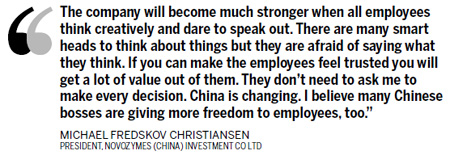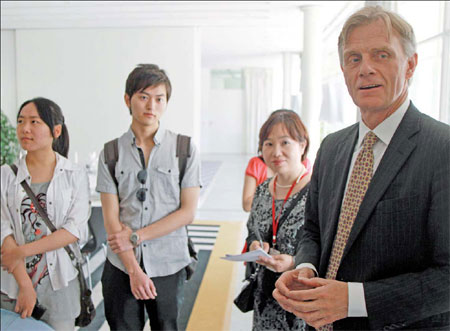Dancing to a different tune
Updated: 2011-09-29 06:51
By Du Juan (China Daily)
|
|||||||||


President of Novozymes (China) sees bio-ethanol as future fuel
BEIJING - It's easy to mistake the tall, elegant figure of Michael Fredskov Christiansen for a professional dancer. Indeed, he did attend his mother's dancing school in his native Denmark. However, the stage he inhabits now is more down-to-earth.
The 43-year-old with a charming smile is president of Novozymes (China) Investment Co Ltd.
It's his firm conviction China will lead the bio-ethanol industry soon so his company is increasing its investment in the country.
Christiansen chose to join Novozymes, the biotech-based world leader in industrial enzymes and micro-organism production, in 1996 when he started his life in China. He said the most important decision he has made in Novozymes is to start the bio-ethanol project because "it is beneficial for China and the industry".
According to the United Nations and industry statistics, world ethanol production for transport fuel tripled between 2000 and 2007 from 17 billion to more than 52 billion liters. From 2007 to 2008, the share of ethanol in global gasoline-type fuel use increased from 3.7 percent to 5.4 percent. In 2010, worldwide ethanol fuel production reached 86.9 billion liters, with the United States as the top producer, accounting for 57.5 percent of global production.
Ethanol fuel is widely used in Brazil and in the US. Together both countries were responsible for 88 percent of the world's ethanol fuel production in 2010. Most cars on the road today in the US can run on blends of up to 10 percent ethanol, and the use of 10 percent ethanol gasoline is mandated in some US states and cities.
Bio-ethanol is a form of renewable energy that can be produced from agricultural feedstocks. It can be made from very common crops such as sugar cane, potato, manioc and corn. There has been considerable debate about how useful bio-ethanol will be in replacing gasoline. Concerns about its production and use relate to increased food prices due to the large amount of arable land required for crops as well as the energy and pollution balance of the whole cycle of ethanol production
The latest big move by Novozymes is to build the largest cellulosic ethanol factory in Heilongjiang province, cooperating with China Oil and Foodstuffs Corp Ltd (COFCO), China's largest oils and food importer and exporter, and China Petrochemical Corp (Sinopec Group), one of the major petroleum companies in the country.
The factory will start operations in the third quarter of the year with an annual production capacity of 10,000 tons of bio-ethanol.
COFCO has invested about 100 million yuan ($15.63 million) in the project over the past five years and Novozymes provides enzymes for it, said Yue Guojun, deputy assistant to the president of COFCO. He said Sinopec also spent about 40 million yuan on the project.
"The bio-ethanol industry is a good option for mankind and it is the right way to give us a green future," Christiansen said.
The cooperation among the three companies is aimed at exploring the commercialization of second-generation bio-ethanol production, which will cover the whole production chain of the fuel ethanol.
COFCO has been cooperating with Novozymes for three years. A demonstration factory with limited production capacity of ethanol has already been operating for two years.
Christiansen said the bio-ethanol fuel industry is particularly important for China because it can deal with the challenges of increasing energy demand in the country. Furthermore, given that transportation is a big pollution contributor in China, by using bio-ethanol fuel, waste emissions will be greatly reduced.
Despite the Chinese government's attitude vacillating over the past few years, Christiansen said he has never hesitated continuing with the project because he believes "ups and downs are normal in any business".
The Chinese government is supportive of first-generation bio-ethanol fuel but at the moment does not fully support the second generation. Christiansen said China can lead the bio-chemical industry if the government continues providing supportive policies and moves faster.
He said the government might not give direct financial support to the companies but there are still many ways to help. He estimated that clearer guidance from the government will emerge in one to two months.
"As a big energy consuming country, the United States has a long tradition of encouraging bio-ethanol production. China is not doing it right now but we cannot see any specific obstacles from the government point of view," said Christiansen. "However, China can run much faster even if it starts later than other countries."
According to the government's 12th Five-Year Plan (2011-2015), the bio-energy industry is one of the new industries that will accelerate development.
China's National Energy Administration (NEA) said in August that the production target of ethanol fuel during the 12th Five-Year-Plan is 5 million tons, 2 million tons more than the target during the 11th Five-year-Plan (2006-2010).
Experts said the plan includes first generation, the one-and-a-half generation and second generation bio-ethanol fuels. China has clearly said it will not enlarge production of first generation bio-ethanol, which is made from grain, so the other two generations will experience fast development over the next five years.
"Novozymes is going to grasp the opportunity because the industry will certainly develop very fast," Christiansen said.
Novozymes is the biggest investor among Danish companies in China, with combined funds at $400 million in the nation. It has a global enzymes production base in Tianjin and China's first foreign biotechnology research center in Beijing.
The company has cooperated with COFCO to develop second-generation bio-ethanol bases since 2006. Meanwhile, some medium-sized companies such as Henan Tianguan Group Co, Heilongjiang Huarun Ethanol Limited Co and Anhui Fengyuan Biochemistry Limited Co, have cooperated in the bio-ethanol business to compete against the bigger players.
Both foreign and domestic big players, including Royal Dutch Shell Group and China National Offshore Oil Corp, are looking for suitable projects in the bio-ethanol fuel markets too.
Christiansen takes it as a good sign for the development of the industry.
"China has a big market so there is space for several players in the industry. The bio-ethanol industry also needs more than one player to develop," he said. "No single company can perform well by itself. Novozymes has an advantage in that we have a strong research and development team, which enables them to focus on being a leader in the industry, especially in the technology sector."
Much discussion about the industry is focused on the subsidies that the government can offer. Christiansen believes that second generation bio-ethanol will become competitive in the international market even without a government subsidy by the end of 2015.
By then, the bio-ethanol industry will be consuming 10 million tons of raw material for production annually, said Christiansen.
"Matters will become more certain when the government's detailed plan comes out," he added. "If we start production, we will be able to survive in the market without significant government subsidy in five years."
He didn't release how much lower the subsidies would be but he said half a dollar's subsidy for one gallon of bio-ethanol production will make the product price competitive in the market.
Nevertheless, China has its own difficulties in terms of bio-ethanol production because of its size. Companies get the raw materials for bio-fuel production from remote villages, often huge distances apart, making collection an expensive business.
Novozymes is fortunate in that a collection system had already been developed by farmers needing agricultural waste to be burned. This provided a template for the company to copy. The company has plans to plant the energy plants in arid areas where it is not suitable for other crops to grow.
"China has a huge area of deserts. We can use the desert to plant suitable energy plants which grow very fast without special requirements if one day we lack raw materials," said Christiansen. "But since we have plenty of the raw materials currently, our company will not do it any time soon."
Christiansen said it is important for a global company to make decisions faster in China because if you are too slow you will discover China is already doing things in a different way.
"We have made some right decisions so far," said Christiansen confidently. "But I feel sometimes like a salesman selling something really new to China. It takes time."
Moreover, understanding the Chinese culture is another important part of succeeding in the country, he said.
"We need to find out what are the most important things for local people. Especially, what are the important things the government focuses on," he added.
Having lived in China for 15 years, it is not an exaggeration to describe Christiansen as a Mr Know-All about the country, those around him said.
He developed some of his knowledge when he went off to work at Carlsberg Group, the fourth-largest beer producer in the world by market share.










